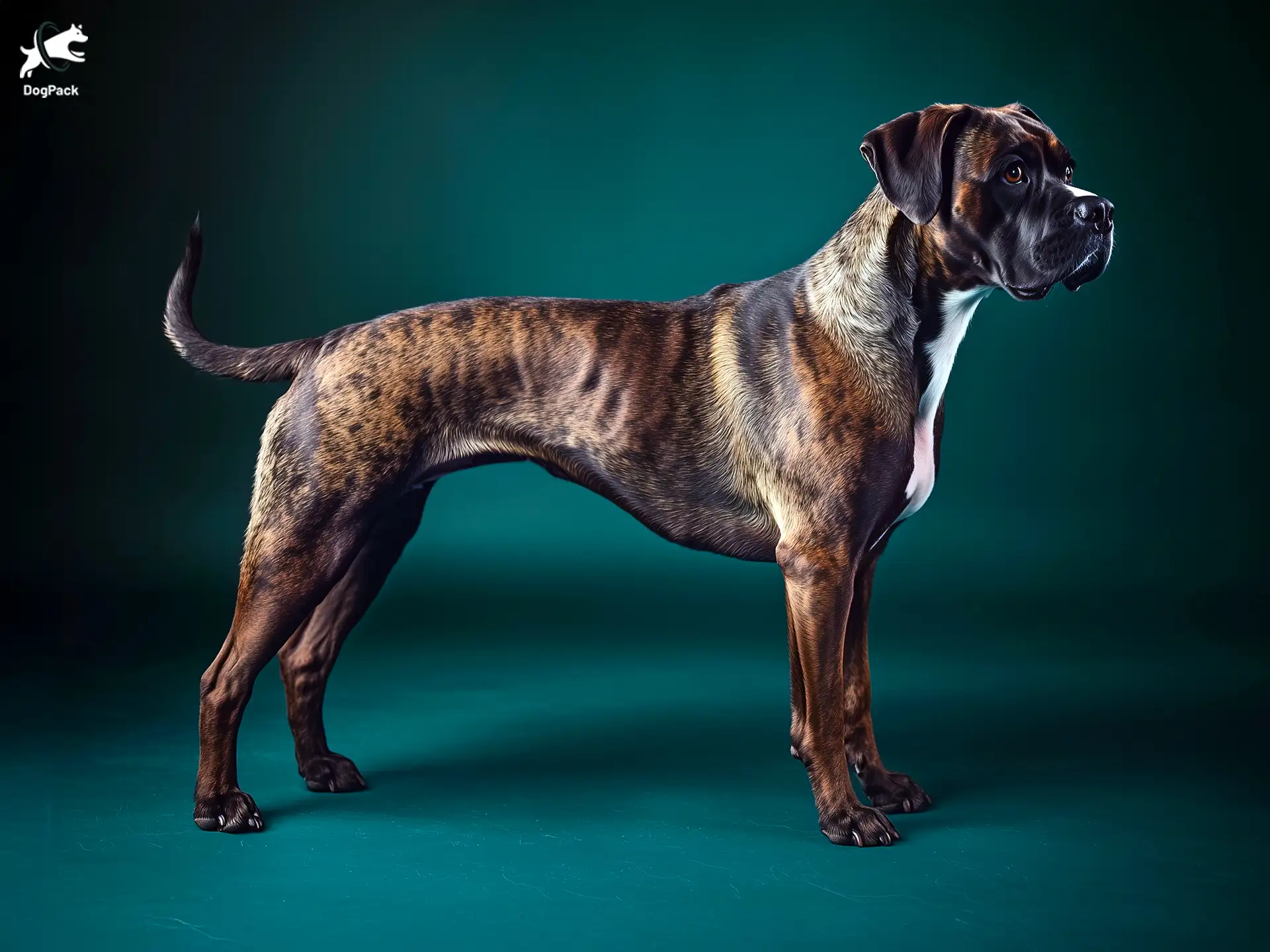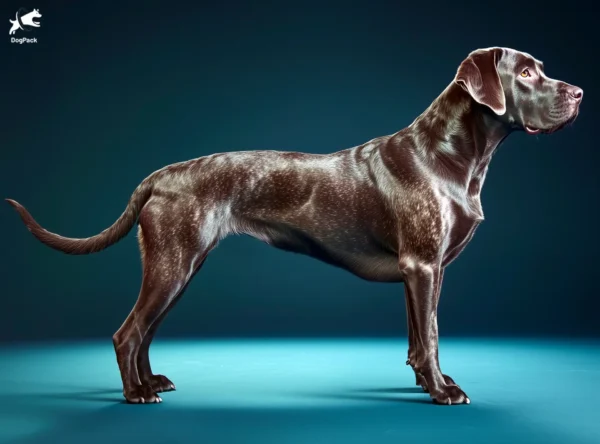Boxador Dog Breed Info & Overview
The Boxador, a mix of Boxer and Labrador Retriever, is the perfect blend of playful energy and loyalty. Known for their intelligence and love of fun, these dogs make excellent family companions. Whether it’s playtime or cuddling, the Boxador brings excitement and warmth to any home, making them an ideal match for those seeking an active, family-friendly pet.
Characteristics
Pictures
Breed History
While the Boxador is a relatively new breed, its parent breeds have rich histories. The Boxer hails from Germany, originally bred in the 19th century as a working dog for hunting and guarding. On the other hand, the Labrador Retriever comes from Newfoundland, Canada, known for its prowess in fishing communities.
The intentional mixing of Boxers and Labradors likely began in the United States in the past few decades, aiming to combine the best traits of both breeds. The result is the Boxador, a dog that inherits the Boxer’s protective instincts and the Labrador’s friendly nature.
Although not recognized by major kennel clubs as a purebred, the Boxador has gained popularity among families and active individuals. Their name is a simple blend of their parents’ names, reflecting the straightforward charm of this lovable mix.
Temperament, Personality
Boxadors are known for their friendly and outgoing personalities. They tend to be affectionate with family members and enjoy being part of the action. With the energy inherited from both parent breeds, they thrive in environments where they have plenty of interaction and stimulation.
These dogs are typically good with children, making them excellent family pets. Early socialization is important to ensure they get along well with other pets and strangers. Their protective instincts from the Boxer side may make them cautious around new people, but proper training can help manage this trait.
Intelligent and eager to please, Boxadors respond well to positive reinforcement during training. They can sometimes be a bit stubborn, so patience and consistency are key. Overall, their loving nature and zest for life make them delightful companions.
Physical Characteristics
Boxadors are typically medium to large-sized dogs, standing between 20 to 25 inches tall and weighing between 50 to 80 pounds. They have a strong, muscular build, reflecting the athleticism of both parent breeds. Their appearance can vary, but they often have the Boxer’s squared head and the Labrador’s expressive eyes.
Their coat is usually short and dense, requiring minimal grooming. Coat colors can range from solid black, brown, brindle, to even a combination of these. Some may have white markings on the chest and feet, adding to their distinctive look.
Boxadors possess a keen expression and an alert stance, always ready for the next adventure. Their ears can be floppy like a Labrador’s or slightly raised like a Boxer’s. Overall, their physical traits embody a blend of strength and friendliness.
Health Issues
While generally healthy, Boxadors can inherit certain health issues from their parent breeds. Hip dysplasia is a common concern, as both Boxers and Labradors are prone to this joint condition. Regular veterinary check-ups and maintaining a healthy weight can help mitigate the risks.
Heart conditions like aortic stenosis can also occur, inherited from the Boxer side. Additionally, they may be susceptible to eye conditions such as cataracts or progressive retinal atrophy. Being vigilant about any changes in vision or behavior is important. According to the American Veterinary Medical Association, regular heart and eye screenings are advisable.
Boxadors might experience allergies or skin sensitivities, so monitoring their diet and environment can be beneficial. Providing a balanced diet and plenty of exercise contributes to their overall well-being. Early detection and proactive care are key to ensuring a healthy life.
Grooming Needs
One of the perks of owning a Boxador is their relatively low-maintenance coat. Their short, dense fur requires brushing once or twice a week to remove loose hair and keep the coat shiny. During shedding seasons, more frequent brushing may be necessary.
Bathing can be done as needed, usually every couple of months or when they get particularly dirty. Overbathing can strip natural oils from their skin, so it’s best to keep it minimal. Use a dog-specific shampoo to avoid skin irritation.
Don’t forget routine care like trimming nails, cleaning ears, and brushing teeth. Their ears should be checked regularly for signs of infection or buildup. Establishing a grooming routine early on helps your Boxador become comfortable with the process.
Exercise Requirements
Boxadors are high-energy dogs that need plenty of physical activity to stay happy and healthy. Aim for at least 60 to 90 minutes of exercise per day. This can include walks, runs, playtime in the yard, or interactive games like fetch.
Their intelligence also means they benefit from mental stimulation. Puzzle toys, obedience training, and agility courses can help keep their minds sharp. Without adequate exercise and engagement, they may become bored and develop undesirable behaviors.
These dogs make excellent companions for active individuals or families who enjoy outdoor activities. Whether it’s hiking, swimming, or playing frisbee, the Boxador is up for the adventure. Regular exercise not only keeps them fit but also strengthens your bond. For more active breeds, check out our Sporting Dogs category.
Training Tips
Training a Boxador can be a rewarding experience due to their intelligence and eagerness to please. Start training early, focusing on basic obedience commands. Positive reinforcement methods work best, using treats, praise, and affection to encourage good behavior.
Consistency is key, as they can sometimes inherit a stubborn streak from the Boxer side. Keep training sessions engaging and varied to hold their interest. Socialization with other dogs and people is crucial to develop a well-rounded temperament.
Address any undesirable behaviors promptly, but avoid harsh corrections. Patience and understanding go a long way with a Boxador. Enrolling in puppy classes or working with a professional trainer can also be beneficial, especially for first-time owners.
Nutrition, Diet
Feeding your Boxador a balanced diet is essential for their health and energy levels. Due to their size and activity, they typically require about 2.5 to 3.5 cups of high-quality dry dog food per day, divided into two meals. Adjust portions based on age, weight, and activity level.
Choose a dog food that is rich in protein to support muscle development and maintenance. Omega-3 fatty acids can benefit their skin and coat, which is helpful if they have any sensitivities. Avoid overfeeding, as obesity can exacerbate joint issues like hip dysplasia.
Consult your veterinarian to tailor a diet plan specific to your Boxador’s needs. They may have dietary requirements inherited from their parent breeds, such as sensitivities to certain ingredients. Fresh water should always be available, especially after exercise.
Adoption, Breeders
If you’re considering adding a Boxador to your family, adopting from a rescue organization is a compassionate option. Many mixed breeds end up in shelters waiting for a loving home. Check local shelters or rescue groups that specialize in Boxers or Labradors.
For those interested in purchasing a puppy, it’s important to find a reputable breeder. Research breeders who prioritize health testing and responsible breeding practices. Ask for health clearances for both parent dogs to ensure your puppy has the best start.
Organizations like the American Canine Hybrid Club provide resources for finding reputable breeders. Always take the time to visit and ask questions to make an informed decision.
Family Pet?
Boxadors can make excellent family pets due to their affectionate and playful nature. They often form strong bonds with family members and enjoy participating in family activities. Their energy levels match well with active households.
With children, they are usually patient and protective, but their size and exuberance can be overwhelming for very young kids. Supervision is recommended to ensure safe interactions. Teaching both the dog and children proper manners promotes harmony.
They can coexist with other pets if properly socialized from a young age. Their friendly disposition makes them generally accepting of other dogs, but introductions should be handled carefully. Cats and smaller animals may require extra supervision due to their prey drive.
Right For You?
Deciding if a Boxador is right for you depends on your lifestyle and expectations. If you lead an active life and can commit time to exercise and train your dog, this breed could be a great match. They thrive with owners who can provide both physical and mental stimulation.
Consider your living space as well. While they can adapt to various environments, a home with a fenced yard is ideal. Apartment living is possible if you are diligent about meeting their exercise needs. They are not well-suited for owners who are frequently away from home.
Ultimately, the Boxador is a loving and energetic companion best suited for those who can offer attention, activity, and affection. If you’re ready for a dog that will keep you on your toes and fill your life with joy, the Boxador might be your perfect companion.
Conclusion
Bringing a Boxador into your life can be a rewarding experience filled with love, laughter, and plenty of activity. Their blend of loyalty, intelligence, and playfulness makes them wonderful companions for active individuals and families alike. If you’re prepared to meet their exercise and training needs, the Boxador could be the perfect addition to your household.
Remember, every dog is an individual, and while breed traits provide a general guideline, each Boxador will have its own unique personality. Spend time getting to know your new friend, and you’ll build a bond that lasts a lifetime.
FAQs
-
Do Boxadors make good guard dogs?
Yes, the Boxador can make a good guard dog due to their protective instincts inherited from the Boxer parent. They are alert and will often bark to alert their owners of strangers, but proper training is necessary to ensure balanced protective behavior.
-
Are Boxadors suitable for apartment living?
Boxadors can adapt to apartment living if they receive sufficient daily exercise. Their high energy levels require regular walks and playtime. Without adequate activity, they may become bored and develop behavioral issues, so commitment to exercise is crucial.
-
How big do Boxadors typically get?
Boxadors usually grow to be 20–25 inches tall and weigh between 50–80 pounds. Their size can vary depending on the genetics of the parent dogs. They are considered medium to large-sized dogs with a muscular build.
-
Do Boxadors get along with other dogs?
With proper socialization, Boxadors generally get along well with other dogs. Early exposure to different animals helps them develop friendly relationships. Monitoring interactions and providing positive experiences can enhance their sociability.
-
What kind of activities do Boxadors enjoy?
Boxadors enjoy a variety of activities that engage both mind and body. They love fetching games, long walks, hiking, and even swimming. Interactive toys and puzzle games are also great for keeping them mentally stimulated.
Breed Ratings
The Boxador is highly intelligent, inheriting sharp minds from both parent breeds, making training engaging and rewarding.
This breed loves to play and is always up for a game, making them great companions for active families and children.
High energy levels mean they need plenty of exercise; they’re perfect for owners who enjoy outdoor activities.
Moderate shedding occurs year-round, so regular brushing helps manage loose hair around the home.
They may have a moderate prey drive; early socialization helps them coexist peacefully with smaller animals.
With a short coat, grooming is relatively easy, requiring minimal effort to keep them looking their best.
Intelligent and eager to please, Boxadors respond well to positive reinforcement but can sometimes be stubborn.
They prefer company and may develop separation anxiety if left alone for extended periods.
Moderate barkers, they may alert you to strangers but aren’t excessively vocal without reason.
Generally low droolers, but some individuals may drool more, especially if they take after the Boxer parent.
Typically friendly with other dogs when properly socialized, enjoying canine companionship.
Generally healthy, but can be prone to certain inherited conditions; regular vet care is important.














